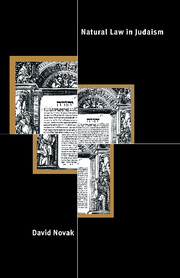6 - Noahide law and human personhood
Published online by Cambridge University Press: 28 October 2009
Summary
This is the record of human progeny: On the day God created man, in the likeness of God He made him, male and female He created them.
(Genesis 5:1–2)NOAHIDE LAW
The debates over natural law in the Jewish tradition have inevitably become debates over the meaning of the Noahide laws. The Noahide laws or “the seven commandments of the children of Noah” (sheva mitsvot benei Noah) are those norms the Rabbis considered to be binding on all humankind, who, following scriptural narrative, are the descendants of Noah. They are the survivors of the universal cataclysm of the Flood. In the version of these laws in the Tosefta and the Talmud, they are presented in the following order: (1) the requirement to establish a judicial system in society (dinim); (2) the prohibition of blasphemy (birkat ha-shem); (3) the prohibition of idolatry (avodah zarah); (4) the prohibition of wanton destruction of human life (shefikhut damim); (5) the prohibition of adultery, incest, homosexuality, and bestiality (gillui arayot); (6) the prohibition of robbery (gezel); (7) the prohibition of eating a limb torn from a living animal (ever min ha-hai).
Those who have argued against natural law in Judaism have characterized this doctrine of Noahide law, in one way or another, as a Jewish version of ius gentium. What they have meant, whether they actually use the term ius gentium or not, is the original meaning of ius gentium that we saw in the previous chapter, namely, law made by Romans for non-Romans over whom they had political power, thus being a judicial policy for the resident-aliens.
- Type
- Chapter
- Information
- Natural Law in Judaism , pp. 149 - 173Publisher: Cambridge University PressPrint publication year: 1998



